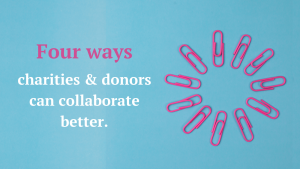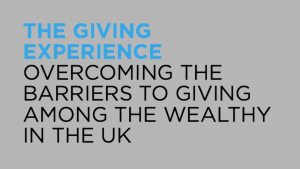Donors: Are you looking to increase your impact? View our short guide on Audacious Philanthropy.
4 ways charities and donors can collaborate better
This article was written by Becky Cackett for Beacon Collaborative. Becky works as a Prospect Development Manager within the UK philanthropy sector.
During the pandemic we saw philanthropists truly step up and show solidarity with charities. We also saw big changes to the way funds were donated, and the number of grant-giving trusts and foundations established in 2020 hit an eight-year high.
But the fight isn’t over. The pandemic has had a significant impact on the income of charities at a time when people need them more than ever. Data from NHS England, for example, confirms that 2020 was the worst year on record for cancer waiting times in England and saw the lowest number of people starting cancer treatment for 10 years.
To address the significant challenges ahead we seriously need to consider how to strengthen the relationships between charities and philanthropists, in a way that meets the needs of both. Here are four areas of improvement with actionable recommendations for charities and donors alike:

1. Develop a shared understanding
A 2019 report commissioned by Barclays Private Bank identified an ‘us and them’ gap between philanthropists and charities as a key barrier to philanthropic giving. In addition, it showed that 23% of HNWIs outside of the US feel they do not have enough knowledge or experience with charities to make a larger gift.
It’s clear that we need to overcome this disparity so we can attain the most effective outcomes for our beneficiaries. Charities sometimes take an approach which can feel transactional, when they should be getting to know the philanthropists they partner with more holistically, understanding their individual skills, interests and motivations.
Philanthropists should feel comfortable being more inquisitive. There are often many opportunities for you to learn more about the organisations you support, including meeting senior staff from within the organisation and visiting their services to deepen your understanding.
Donors: Utilise the resources charities provide to understand the issue in greater depth.
Charities: Dedicate more time to getting to know your donors and what drives them.
2. Know that communication is key
Feeding into the above, we know that developing trust between philanthropists and charities is vital to forming strong and impactful relationships, which will ultimately have the best outcomes for those we support.
In the Barriers to Giving report, 25% of HNWIs cited a ‘lack of control over how the money is spent’ as a barrier to giving. Openness and communication can help to build trust and to overcome obstacles like this. Philanthropists shouldn’t be afraid to ask questions about how their money will be spent, or how a charity is financed or governed. Charities do not want to lose donors and will often be willing to go above and beyond to address any issues.
In return for this openness, donors deserve transparency and accountability from the charities they choose to support. It is incredibly important to feedback to your donors when something is not going well.
Donors: If you’re not sure about something, ask the charity for clarity.
Charities: Don’t hide your failures from donors – they appreciate and deserve honesty.
3. Understand the importance of flexibility in funding
As Clare Wilkins from New Philanthropy Capital says, Covid-19 has been a ‘testing phase’ for the charity sector. During this phase donors have given more flexibly to charity than ever before.
Now that it’s clear the effects of Covid-19 will endure for years to come, it is vital that philanthropists continue to stand with the organisations they support and help to secure their future sustainability. For donors to do this effectively, charities need to help them to understand the value of unrestricted funding, which allows money to be spent when and where it is needed most.
But charities also need to reward the trust which has been placed in them by supporting philanthropists’ desires to be change-makers, and there are many opportunities to be part of innovative work if this is their preference. Beyond this, charities would benefit from identifying where individual philanthropists have skill sets which would complement specific projects.
Donors: Consider if you can support organisations more flexibly, for example by funding core costs.
Charities: Educate donors on why core funding is so integral to your work.
4. Be proud of what you’ve achieved together
This year, for the first time in its history, The Sunday Times Giving List saw donations from the UK’s top 200 philanthropists reach an amazing £4.3bn. In the UK, philanthropists and charities achieve so much together, but celebrations of these successes in the media are relatively rare. This contrasts with the US media where these stories are commonplace.
Photo used courtesy of CAF. All rights reserved.
Philanthropists may feel understandably reticent for their stories to be shared in the general media. Charities can support this by opening their own external communication channels and telling these shared success stories in the most appropriate way for both sides, with a focus on the transformative impact of a large gift.
It’s so important that charities and philanthropists feel able to shout about their successes together. This encourages others to give, and to have the opportunity to experience the fulfilment that comes with developing a deep relationship with a charity and its people.
Donors: Seek to inspire! Look for opportunities to share your giving stories.
Charities: Tell the stories of donors, not just beneficiaries; develop giving role models.
Final thoughts
In the past 18 months, charities saw an increase in support from philanthropists when other income was severely reduced. But how can we sustain this momentum? Together, charities and philanthropists should nurture their relationships with open communication, honesty, and understanding, and celebrate when they’ve achieved something together. Let’s never forget that we’re working towards a shared goal.
Becky Cackett works as a Prospect Development Manager within the UK philanthropy sector. She has worked and volunteered for some of the UK’s largest charities spanning a wide range of different causes. You can connect with Becky here.


